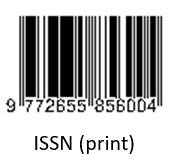Appropriate Technology-Based Project-Based Learning: 3D Printing Utilization for Learning Media Class
(1) Sanata Dharma University
(*) Corresponding Author
Abstract
Indonesia has more than ten thousand islands, making it an archipelago; therefore, the distribution of learning media and facilities over the country is difficult. This condition may affect the learning material delivery and the student's understanding. Thus, the do-it-yourself (DIY) learning media helps to overcome this condition. We investigated the usefulness of applying appropriate technology through the 3D printing technique to fabricate learning media inspired by local wisdom to meet the needs of learning media. The students were guided by a project-based learning (PjBL) method to find the problem, design their learning media, fabricate it using a 3D printer, and expected to be applied to deliver the teaching material in the class. This study aimed to observe the implementation of the designing process based on theory to reality. A qualitative method and questionnaire were used to measure student's responses. We found that PjBL learning based on a 3D printing project increases students' motivation through creativity and effectiveness in delivering the teaching materials. Furthermore, 3D printed-based learning media can easily be fabricated, producing less waste.
Full Text:
PDFReferences
L. Hakim, “Pemerataan akses pendidikan bagi rakyat sesuai dengan amanat Undang-Undang Nomor 20 Tahun 2003 tentang Sistem Pendidikan Nasional”, EduTech: Jurnal Ilmu Pendidikan Dan Ilmu Sosial, 2(1), 2016.
R. Niswaty, M. Nasrullah, and H. Nasaruddin, “Pelayanan publik dasar Bidang Pendidikan tentang sarana dan prasana di Kecamatan Pulau Sembilan Kabupaten Sinjai”, in Seminar Nasional LP2M UNM, 1(1), 2019.
C. Hopkins and R. McKeown, “Education for sustainable development: an international perspective”, Education and sustainability: Responding to the global challenge, 13, 13-24, 2002.
A. B. Santosa, “Potret pendidikan di tahun pandemi: dampak COVID-19 terhadap disparitas pendidikan di Indonesia”, CSIS Commentaries, 1-5, 2020.
D. Hairi, “Respon Pemuda Perbatasan Dalam Menghadapi Keterbatasan Fasilitas Pendidikan Pada Pulau Combol Desa Selat Mie Kecamatan Moro Kabupaten Karimun”, Universitas Maritim Raja Ali Haji.
I. D. P. Subamia, “Analisis kebutuhan tata kelola tata laksana laboratorium IPA SMP di Kabupaten Buleleng”, JPI (Jurnal Pendidikan Indonesia), 3(2), 2015.
A. O'Dwyer and P. E. Childs, “Who says organic chemistry is difficult? Exploring perspectives and perceptions”, Eurasia Journal of Mathematics, Science and Technology Education, 13(7), 3599-3620, 2017.
G. Sirhan, “Learning difficulties in chemistry: An overview”, 2007.
H. K. Wu, J. S. Krajcik, and E. Soloway, “Promoting understanding of chemical representations: Students' use of a visualization tool in the classroom”, Journal of Research in Science Teaching: The Official Journal of the National Association for Research in Science Teaching, 38(7), 821-842, 2001.
T. A. Holme, “Can We Envision a Role for Imagination in Chemistry Learning?”, Journal of Chemical Education, 98(12), 3615-3616, 2021.
Y. D. Puspitarini and M. Hanif, “Using Learning Media to Increase Learning Motivation in Elementary School”, Anatolian Journal of Education, 4(2), 53-60, 2019.
G. Salomon, “Media and symbol systems as related to cognition and learning", Journal of educational psychology, 71(2), 131, 1979.
P. S. Cowen, “Film and text: Order effects in recall and social inferences”, ECTJ, 32(3), 131-144, 1984.
C. Brivio, “Off main grid PV systems: appropriate sizing methodologies in developing countries”, 2014.
M. Jiménez, L. Romero, I. A. Domínguez, M. d. M. Espinosa, and M. Domínguez, “Additive manufacturing technologies: an overview about 3D printing methods and future prospects”, Complexity, 2019.
M. C. Ratri, A. I. Brilian, A. Setiawati, H. T. Nguyen, V. Soum, and K. Shin, “Recent Advances in Regenerative Tissue Fabrication: Tools, Materials, and Microenvironment in Hierarchical Aspects”, Advanced NanoBiomed Research, 1(5), p. 2000088, 2021.
J. Choi, J.-H. Lee, and B. Kim, “How does learner-centered education affect teacher self-efficacy? The case of project-based learning in Korea”, Teaching and Teacher Education, 85, 45-57, 2019.
N. H. Fiktoyana, I., S. Arsa, P., Adiarta, A., “Penerapan Model Project Based Learning Untuk Meningkatkan Hasil Belajar Dasar Dan Pengukuran Listrik Siswa Kelas X-TIPTL 3, SMKN 3 Singaraja”, Jurnal Pendidikan Teknik Elektro Undiksha, 7(3), 90-101, 2018.
DOI: https://doi.org/10.24071/ijasst.v4i2.5308
Refbacks
- There are currently no refbacks.
Publisher : Faculty of Science and Technology
Society/Institution : Sanata Dharma University

This work is licensed under a Creative Commons Attribution 4.0 International License.












